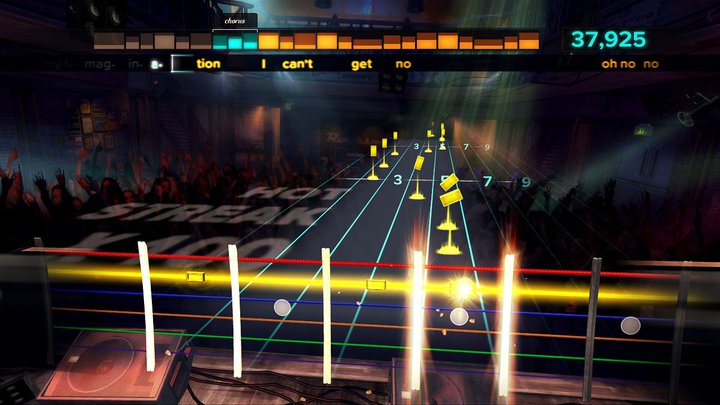Review: Rocksmith
Using real musical instruments in a rhythm game is not a new idea, but in games like Rock Band 3, they were not the main focus of the gameplay. Rocksmith however, takes the idea to the next level, as the new game from Ubisoft Montreal uses an adapter for any guitar with a 1/4” jack, and is built entirely around the concept of an authentic guitar-playing experience within the framework of a video game.
But Rocksmith is a hard game to categorize, since it attempts to offer players an educational tool to learn to play guitar, while still maintaining the accessible feel of arcade-style rhythm games like Guitar Hero or Rock Band.
For most games, this would be a fatal flaw, but Rocksmith manages its identity crisis fairly well to produce an experience that, while not perfect, succeeds fairly well in giving beginners a grasp of basic techniques and also provides a fun gameplay experience.

The technology created for Rocksmith is impressive in its own right, as simply plugging in the USB adapter and going through a simplified tuning process allows the game to recognize just about any action you make on the guitar. The instruction manual cautions players to only use an analog sound output, however, to avoid input delay.
Rocksmith starts players off with very basic techniques, like single note rhythms, and slowly introduces things like fret positioning, sustained notes, slams, and so on. Each string corresponds to a colored one on screen, and the game displays numbered frets to help you recognize where to place your fingers.
Players can choose to customize their in-game equipment in the Amp mode, which lets you jam and experiment with just how accurately the game replicates your guitar skills. Most of the game consists of the Journey mode, though, which allows you to rehearse and play events to gain respect points (RSP) and unlock new techniques and equipment.
This is where the game's adaptive difficulty comes into play, which is Rocksmith's most brilliant, and most frustrating feature. Players cannot select any of the roughly 20 difficulty levels on their own before starting a song or event, aside from deciding whether it focuses on playing single notes or more complicated combinations of chords.
Instead, Rocksmith will attempt to detect how well one plays on a given section of the song and adjust the difficulty accordingly. For more experienced players, this is may cause them some frustration at first as they need to slog through simple arrangements before being presented with a chance to show off their skill, but generally the game does a good job of adjusting itself.
For beginners, the adaptive difficulty is mostly effective, as Rocksmith will never stop the song if you play badly, uses on screen indicators to tell you exactly what you did wrong, and simplifies the arrangements to something more manageable, so you can regain your focus and comfort level. It usually adjust fast enough, but the downside to this is that you do have to play badly for the game to give you a break, as each time you do well, they game pushes you to the next level of difficulty.
This can be very rewarding if you can master the new techniques and more complicated sequences quickly enough, but if not, it can be very discouraging, as you can seem to be constantly fighting against the game, at least until it adjusts the difficulty again. This might also contradict the Rocksmith's function as an educational tool, as the process of repetition, mastery, and reward can prevent you from reaching the "reward" part for longer than you might like.
Despite this, Rocksmith maintains a sense of fun and freshness that keeps you wanting to continue playing even when things get hard. Much of this comes from the fact that you use a real instrument, and so you feel a greater sense of accomplishment than if you were using the plastic controllers of previous rhythm games. The game rewards perseverance in this way, so whether or not you actually learn to play guitar, you should get to a point where you feel comfortable playing the game.
For experienced guitarists, though, you might not find an experience that pushes your understanding of the instrument beyond what you already know. But if you can make it past the beginner stages, you should find at least an entertaining way to use your guitar.

Rocksmith also contains other play-modes aimed at allowing you to practice specific techniques. A minigame collection, called "Guitarcade," allows you to use what you learn to complete arcade-style tasks, like shooting ducks with different fret positions. These diversions actually turn out to be very entertaining, but many remain locked until you progress through the game. Another mode called "Technique Challenges" is more of a pure practice mode focused on specific techniques, so you can work on those you are struggling with before continuing with Journey mode.
While there is no online multiplayer, you can set up a second guitar or a microphone for singing lyrics with a second player. This still feels limited, however, so using Rocksmith as a party-game in the same fashion as Rock Band or Guitar Hero might be out of the question.
The song selection is fairly broad, but still conventional, with about 50 songs ranging from Nirvana and the Rolling Stones, to the Black Keys and Jarvis Cocker. Ubisoft also promises more to come by way of DLC.
Overall, Rocksmith is an ambitious product that succeeds in providing an entertaining, but strangely specialized product. While it is unclear whether a player would actually learn to play guitar by using Rocksmith as an educational tool, the game would certainly have them playing a lot more if they decide to put effort into the game.
The game is definitely a commitment, too, since if you do not own a guitar, you will need to buy the $200 Epiphone Les Paul Jr. Bundle, as well as a few accessories for proper storage. What you want out of Rocksmith – a fun party game versus a unique practice tool – should determine whether or not you buy it. If you are looking to get into playing guitar, Rocksmith should offer you an entertaining starting point.
Score: 7.5/10
Best way to find more great content from Neon Tommy?
Or join our email list below to enjoy the weekly Neon Tommy News Highlights.



